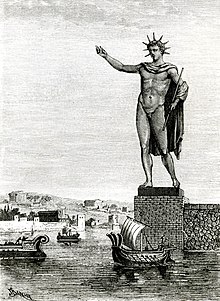
Ancient Greek literary sources claim that among the many deities worshipped by a typical Greek city-state (sing. polis, pl. poleis), one consistently held unique status as founding patron and protector of the polis, its citizens, governance and territories, as evidenced by the city's founding myth, and by high levels of investment in the deity's temple and civic cult. The temple of the deity involved was usually founded on the highest ground (acropolis) within the city walls, or elsewhere within the central public assembly space, the agora. Conversely, a city's possession of a patron deity was thought to be a mark of the city's status as polis.
Some poleis seem to have had several "patron gods" in sequence, or all at once. Some had more than one founder, or founding myth. A few would have superficially resembled a collection or tribal coalition of villages rather than the single, centralised entity suggested by the English term "city-state"; early Sparta provides a clear example of this. Some poleis seem to have had no distinct or identifiable patron deity.